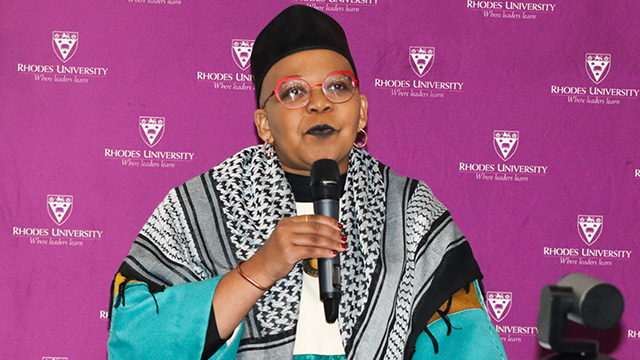By Siviwe Mxuma
Rhodes University recently hosted the prestigious Vice-Chancellor’s Book Award Lecture, which honoured one of the institution’s most distinguished scholars, Associate Professor Siphokazi Magadla, from the Department of Political and International Studies.
The event was a celebration of her book Guerrillas and Combative Mothers: Women of the Armed Struggle in South Africa, published by the University of KwaZulu-Natal Press last year. This important work provides a thorough examination of women’s roles in South Africa’s armed struggles against Apartheid from 1961 to 1994.
The evening was opened by Rhodes University Vice-Chancellor, Professor Sizwe Mabizela, who gave a glowing introduction to Prof Magadla and her contributions. He began by extending a warm welcome to the attendees, saying, “Welcome to you all to Professor Magadla’s Book Award Lecture. We extend a very special welcome to Professor Magadla’s family, friends, collaborators, and colleagues.”
He further emphasised the significance of the Vice-Chancellor’s Book Award, which is given annually to a staff member whose work brings recognition and credit to Rhodes University through its scholarly contributions.
The lecture was not only a tribute to Prof Magadla’s book but also a reflection of her broader academic and social impact. Prof Mabizela praised her for her academic rigour and the depth of her research.
Prof Magadla, originally from Ludaka in Ngqeleni, has spent years conducting research on gender, militarism, and war, with a specific focus on South Africa. Her work offers a powerful narrative of 40 women who participated in the armed struggle against Apartheid and their lives in the post-Apartheid era. These women’s stories shed light on the complexities of South Africa’s fight for liberation, detailing their involvement in Umkhonto weSizwe (the ANC’s military wing) and the Pan Africanist Congress’s armed wing, APLA.
After Prof Mabizela’s introduction, Prof Magadla took the stage and delivered an insightful lecture. She expressed her appreciation for the critical engagement her book has received, remarking, “The ways in which this book has travelled since its publication in February of 2023, have affirmed my view of intellectual work as village work.”
Prof Magadla’s reflection on the concept of “village work” was a central theme in her lecture. She cited scholars like bell hooks and Cornel West, explaining how intellectuals are nurtured by their communities and shaped by their socio-political environments. She used this to highlight how her academic journey and book were grounded in the histories, traditions, and struggles of African women. Her lecture illustrated how these women not only engaged in armed resistance but also democratised and transformed liberation movements in South Africa, ultimately laying the foundation for gender equality in the country.
In Guerrillas and Combative Mothers, Prof Magadla meticulously traces the journeys of women who were formally trained in guerrilla warfare with Umkhonto weSizwe, as well as those who participated in the rural and township insurrections led by the PAC. She explores the multiple fronts on which these women fought, not only for national liberation but also for gender equality, emphasising how their contributions have been central to shaping democratic South Africa.
One particularly poignant moment in the lecture came when Prof Magadla shared her personal connection to the topics of militarism and gender. She recounted how her upbringing, with a father who had been part of the newly formed South African National Defence Force, shaped her curiosity and scholarly focus. This personal narrative allowed the audience to understand how her lived experiences informed her academic interests and commitment to highlighting women’s roles in South Africa’s armed struggles.
The lecture also emphasised the book’s broader significance. Prof Magadla explained that Guerrillas and Combative Mothers is not just about recounting historical facts, but also about connecting the struggles of these women to contemporary issues of social justice. She reminded the audience that the fight for gender equality continues, and that understanding the histories of women in liberation movements is crucial to sustaining the gains made in South Africa’s democracy.
Prof Siphokazi Magadla’s Guerrillas and Combative Mothers is undoubtedly a significant contribution to the literature on South Africa’s liberation struggle, providing a much-needed focus on the women who fought, often in the shadows, for freedom and equality. The recognition she received at the Vice-Chancellor’s Book Award Lecture not only celebrates her past achievements but also sets the stage for further scholarly and public engagement with the legacies of these women.
This article was first published by the Rhodes University Communication Division.


